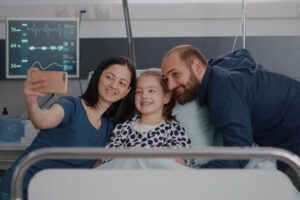Turning Medical Errors into Lifesaving Lessons
Imagine a world where doctors openly discuss their most challenging mistakes not behind closed doors, but on a public platform for all to learn from. Medical Mistake, a flagship series on the Top Doctor Channel, dares to do exactly that. In an era when medical errors are often spoken of in hushed tones, this groundbreaking show shines a bold light on the topic — transforming harrowing real-life cases into powerful lessons. The result is a catchy, inspirational program that resonates with everyone from seasoned surgeons and medical students to patients and the general public.
Medical errors have been cited as one of the leading causes of death worldwide, a stark reminder that even the best healthcare systems have room for improvement. Medical Mistake tackles this reality head-on. Each episode dives into a real case where something went wrong in a medical setting. These cases span all fields of medicine — from surgical mishaps and misdiagnoses to medication mix-ups and communication breakdowns — reflecting the many ways errors can occur. But rather than casting blame, the focus is on understanding what happened and how such errors can be prevented in the future. It’s a format that not only educates and raises awareness about the consequences of medical errors, but also fosters a culture of humility, learning, and accountability in healthcare. By turning painful incidents into teachable moments, Medical Mistake shows that every error — no matter how tragic — can spark change for the better.
Real Cases, Real Lessons: Inside the 'Medical Mistake' Format
What makes Medical Mistake so compelling is its unique format of analyzing real medical mistake cases. The show isn’t a scripted drama or a fictional re-enactment; it’s built on true stories from hospitals and clinics. Viewers get an inside look at the complexity of healthcare and how, under certain conditions, an oversight or misjudgment can happen to even the most experienced professionals. Crucially, Medical Mistake approaches these cases with compassion and a solutions-oriented mindset. The tone is investigative yet empathetic — more like an in-depth case study than a sensational exposé.
In a typical episode of Medical Mistake, viewers might see:
The Story Unfolds: A vivid recounting of the events leading up to a critical error. This often includes firsthand interviews or thoughtfully crafted reenactments that put you in the shoes of the medical team and patient as the situation develops.
Voices of Those Involved: The doctors, nurses, or staff directly involved in the case share their perspective. They bravely describe what they observed, the decisions made, and the moment they realized something went wrong. This honest reflection sets the stage for meaningful insight, showing that even highly skilled professionals are human.
Expert Analysis: Medical experts and patient safety specialists then step in to analyze the case. They break down what happened and why. Were there systemic issues, such as communication breakdowns or fatigue? Were there cognitive biases or miscommunications at play? The show explains these factors in clear, accessible terms, so both medical insiders and laypersons can grasp the nuances.
Consequences and Aftermath: Medical Mistake does not shy away from the outcomes. Viewers learn about the impact on the patient and their family, highlighting why the error was so serious. Importantly, we also see the emotional toll on the healthcare providers. This segment underscores that medical mistakes have real human consequences, and that behind every statistic is a life affected.
Lessons and Improvements: Finally, each episode concludes on a forward-looking note. It highlights what changes were made after the error — perhaps a new hospital protocol, better communication practices, or additional training. The episode distills key lessons learned, emphasizing how that case has spurred improvements to prevent future mistakes. This wrap-up transforms each story from a tragedy into a catalyst for progress.
Through this format, Medical Mistake manages to be both educational and engaging. It’s almost like attending a medical seminar blended with the narrative pull of a documentary. The show’s case-based approach ensures that viewers are not just hearing dry facts; they are emotionally invested in the story, which makes the lessons far more memorable. By the time the credits roll, you haven’t just been informed — you’ve been moved and inspired to think about how healthcare can be made safer.
Empowering Medical Professionals Through Reflection
For doctors, nurses, and other healthcare professionals, Medical Mistake has become a powerful source of reflection and continuous learning. In medicine, it’s often said that “every day is a school day” — there is always something new to learn. This show takes that ethos to a new level by allowing professionals to learn from real-world errors that they might never encounter directly. It’s as if the entire medical community is invited to one big, candid morbidity and mortality conference (the traditional meetings where clinicians review and learn from adverse events) — except now it’s on a screen, accessible anytime.
Watching Medical Mistake, seasoned practitioners see scenarios that could easily mirror challenges in their own practice. A surgeon might watch an episode about a communication failure in the operating room and be reminded to double-check team briefings. An ER physician might see a case about a subtle symptom that was overlooked and resolve to be more vigilant with future patients. These stories resonate because they are drawn from the very world medical professionals inhabit daily. The impact is immediate: “That could have been me or my team,” many realize, which fuels a determination to apply the lessons learned.
Importantly, the show also provides a sense of solidarity and support for healthcare workers. Medicine can be high-pressure, and the fear of making a mistake weighs heavily on providers. Seeing colleagues on screen openly discussing their errors — and the fact that they have found ways to grow from them — helps reduce the stigma around these conversations. It encourages a culture where admitting an error is seen not as humiliation, but as a courageous step toward improvement. Medical Mistake emphasizes accountability over blame: the healthcare providers featured often take responsibility and focus on making things right. This is a powerful example for viewers in the field. It reassures them that acknowledging a mistake, apologizing, and learning from it is not only okay, but the right thing to do.
Many hospitals and clinics have even started leveraging the show as a training tool. Episodes spark conversations in break rooms and during team meetings: “Did you catch the one about the medication error? What would we do differently here?” These discussions are exactly what the show’s creators hoped for — turning passive viewership into active quality improvement. In this way, Medical Mistake doesn’t just recount isolated incidents; it creates ripple effects, inspiring doctors and nurses everywhere to double-check their processes, improve communication, and maintain a vigilant commitment to patient safety.
Inspiring the Next Generation of Doctors
For medical students and trainees, Medical Mistake is like getting a front-row seat to some of the most important lessons that medical school can’t always teach in lectures. In schools and residency programs, aspiring doctors learn a wealth of knowledge about anatomy, diseases, and treatments. Yet, the human side of medicine — especially dealing with errors and complications — is often learned only through personal experience. Medical Mistake bridges that gap by bringing real clinical cases to life, complete with all their complexity and gravity.
Young viewers entering the field are often riveted by the show’s candid portrayal of situations they may one day face. Each episode is a case study richer and more vivid than any textbook example. A student might learn about a misdiagnosis case in theory, but when Medical Mistake presents the story of a missed diagnosis and walks through the fallout, the lesson becomes deeply ingrained. The next time that student sees a patient with a puzzling condition, they’ll remember the episode and think twice, perhaps catching a detail that could have been overlooked.
Moreover, Medical Mistake serves as a moral and ethical compass for the next generation. It demonstrates the importance of taking responsibility and communicating honestly when things go wrong. By seeing seasoned doctors on the show admit, “Here’s what I missed” or “I should have done this differently,” students learn that medicine isn’t about being infallible — it’s about striving to be better. This is an inspiring message for young professionals who might otherwise feel immense pressure to be perfect. The show teaches that it’s okay to acknowledge a mistake as long as you use it to improve your skills and systems.
The inspirational impact on students can hardly be overstated. Many educators encourage their students to watch certain episodes, sparking classroom discussions on patient safety and ethics. Some training programs even integrate insights from the show into their curriculum, treating Medical Mistake as a valuable adjunct to traditional training. Imagine a generation of new doctors who enter the workforce already mindful of common pitfalls and empowered to speak up about safety — that’s the kind of future Medical Mistake is helping to build.
Educating and Engaging the Public
One of the most remarkable achievements of Medical Mistake is how it captivates and educates the general public. Medical dramas and reality TV have long been popular, but this show is different: it’s not fiction or mere spectacle, it’s real life with a real purpose. By pulling back the curtain on how errors can happen in healthcare, Medical Mistake demystifies a world that can be intimidating for patients. In doing so, it empowers viewers in their roles as current or future patients and family members.
For many in the public, the initial reaction to hearing about medical errors is shock: “How could that ever happen?” Medical Mistake takes the time to answer that very question in an informative, non-alarmist way. Viewers learn about the complex, high-stakes environment of hospitals — the countless decisions and communications happening every minute, and how easily a lapse can occur if safeguards fail. They also learn that behind every error is a caregiver who is often devastated by what happened. This knowledge fosters empathy. Rather than simply fearing doctors or hospitals, viewers come away with a better understanding of the challenges healthcare professionals face and the shared goal everyone has to make care safer.
Crucially, the show equips the public with knowledge. Each episode subtly educates on medical terms and procedures, making sure to explain jargon in plain language. Viewers might pick up tips like the importance of keeping an updated medication list, or the value of asking questions like “What is this drug I’m being given?” or “Could it be something else?” if they feel unsure. Medical Mistake encourages patients to be active participants in their healthcare, advocating for themselves and double-checking information when appropriate. This isn’t about shifting responsibility to patients, but about creating partnerships — when doctors and patients work together attentively, mistakes are less likely to slip through the cracks.
The general public also finds the show deeply engaging on a human level. The stories are often emotional, showing the resilience of patients who recover and the dedication of healthcare workers who go the extra mile to set things right. Viewers from all walks of life can relate to these human stories — whether it’s a parent empathizing with a family whose child was affected by a medical slip-up, or someone who’s been a patient relating to the vulnerability of being in a hospital bed. In the end, Medical Mistake doesn’t sow fear; it builds trust. By openly addressing errors, the show sends a powerful message that the medical community is serious about learning from mistakes and improving care for everyone.
Fostering a Culture of Learning and Accountability
Beyond individual stories and audience groups, Medical Mistake stands as a beacon for a broader cultural shift in healthcare. Historically, medical errors were often brushed under the rug — discussed quietly among peers if at all. The fear of legal action, damage to reputation, and professional embarrassment created a “culture of silence” where mistakes were hidden. Medical Mistake boldly challenges that old mentality by demonstrating the incredible value of transparency. In doing so, it contributes to a culture of learning and accountability that benefits both providers and patients.
The show consistently reinforces the idea that acknowledging errors is not a sign of weakness, but of strength and integrity. Each episode highlights healthcare professionals who step forward and say, “This happened, and here’s what we’re doing to ensure it never happens again.” This is the essence of accountability — not just saying sorry, but actively working to improve. When providers on the show take ownership of mistakes, it sends a ripple effect through the healthcare industry. Colleagues watching are inspired to cultivate that same honesty in their own practice. Hospitals might be encouraged to implement more open error-reporting systems and encourage staff to speak up about near-misses, knowing they will be met with support and a problem-solving mindset rather than punishment.
Of course, Medical Mistake also emphasizes that accountability goes hand-in-hand with systemic change. Many errors are not simply the result of an individual’s oversight; they can stem from flawed systems, unclear protocols, or even outdated technology. The series often explores these contributing factors, implicitly advocating for hospitals and clinics to make necessary changes. It shows that a truly accountable healthcare system looks at how an error happened at all levels, rather than zeroing in on “who is to blame.” This approach aligns with the modern concept of a “just culture” in healthcare — one that balances learning with accountability, so that mistakes lead to improvement, not just reprimand.
The broader impact is a hopeful one: Medical Mistake is helping to normalize the conversation about patient safety. Each time an episode airs and sparks discussion, the taboo around discussing medical errors erodes a little more. The show is planting seeds in the minds of its viewers — whether it’s a hospital administrator reconsidering their safety protocols after watching, or a viewer writing to their local clinic about a new practice they learned of from the show. The conversation is spreading beyond the screen and into real-world action.
Inspiring a Safer Future for All
At its heart, Medical Mistake is more than just a television show — it’s a catalyst for change and a source of inspiration. By spotlighting how tragic errors can lead to positive transformations, it delivers a message of hope: that through honesty and learning, we can build a safer healthcare system. The show’s impact on diverse audiences proves that this message resonates widely. Doctors feel motivated to continually sharpen their skills. Students feel guided and less afraid of the challenges ahead. Patients feel reassured that progress is happening and that their well-being is the ultimate focus.
The inspirational tone of Medical Mistake comes from its ability to look at adversity and see opportunity. Yes, the stories can be heartbreaking, but they are never left on a negative note. Instead, each episode rises toward solutions and improvements. This approach reminds us that every mistake, once acknowledged, holds the potential to teach us something new. In a field as complex as medicine, nobody can promise zero errors — but what we can promise is to learn from each one. Medical Mistake takes that promise and broadcasts it for the world to see.
The ripple effects of this show’s ethos are already evident. Healthcare professionals are speaking more openly about errors and near-misses, implementing changes, and encouraging their peers to watch and discuss. Viewers at home are becoming more informed and engaged in their own care. Even those who have never set foot in a hospital find inspiration in the broader lessons of humility, accountability, and perseverance that the series imparts.
In a world where it’s easy to focus on blame or hide imperfections, Medical Mistake offers a refreshing and uplifting perspective. It champions the idea that facing our shortcomings head-on is how we ultimately triumph. The show has sparked a conversation that bridges the gap between hospitals and homes, between caregivers and patients. That conversation is driving a shared mission: to ensure that the tragedies of yesterday become the fuel for a safer, smarter, and more compassionate tomorrow.
Medical Mistake is, in a phrase, turning pain into purpose. By learning from yesterday’s errors, we are safeguarding tomorrow’s successes. And that is a lesson truly worth broadcasting, for the benefit of all.






